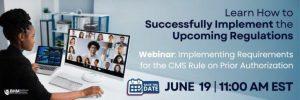|
|
Compliance remains a critical concern for providers. As regulations and standards continually shift, staying ahead of compliance trends is essential to ensure that healthcare organizations remain in good standing and avoid penalties. This guide will outline key strategies that healthcare providers can adopt to stay ahead of compliance trends, focusing on proactive measures, technological adoption, continuous education, and effective communication.
Current & Upcoming Legislation Providers Should Know About
Staying informed about current and upcoming legislation is critical for healthcare providers to maintain compliance and optimize operations. One significant regulatory change is the CMS Final Rule (CMS 0057-F), which was finalized in 2024. This rule introduces several important updates aimed at enhancing transparency and improving patient care.
CMS 0057-F mandates that providers submit detailed cost and pricing data, enabling patients to make more informed decisions about their care. The rule also includes stricter requirements for the interoperability of Electronic Health Records (EHRs), ensuring seamless data exchange between healthcare systems. Providers must ensure their EHR systems are updated to meet these new standards to avoid penalties and improve patient outcomes.
Provider’s Quick Guide to Staying Ahead of Compliance Trends
Proactive Measures
Proactivity is crucial in managing compliance. Healthcare providers must stay informed about upcoming changes in regulations by  regularly reviewing updates from regulatory bodies such as the Centers for Medicare & Medicaid Services (CMS), the Health Insurance Portability and Accountability Act (HIPAA), and the Office of Inspector General (OIG). Subscribing to newsletters, attending webinars, and participating in industry forums can provide valuable insights into impending regulatory changes.
regularly reviewing updates from regulatory bodies such as the Centers for Medicare & Medicaid Services (CMS), the Health Insurance Portability and Accountability Act (HIPAA), and the Office of Inspector General (OIG). Subscribing to newsletters, attending webinars, and participating in industry forums can provide valuable insights into impending regulatory changes.
In addition, conducting regular internal audits is vital. These audits should assess current compliance status, identify potential areas of risk, and ensure that existing policies and procedures align with the latest regulations. By identifying issues early, providers can take corrective actions before they escalate into significant compliance breaches.
Technological Adoption
Embracing technology is another effective strategy for staying ahead of compliance trends. Advanced software solutions can streamline compliance processes, enhance data security, and facilitate accurate reporting. For example, Electronic Health Records (EHR) systems can help ensure that patient information is recorded and stored in compliance with HIPAA regulations.
Moreover, implementing compliance management software can automate tracking of regulatory changes, manage documentation, and monitor adherence to compliance requirements. These tools often include features like risk assessment modules, policy management systems, and training platforms, making it easier for healthcare providers to maintain compliance.
Continuous Education
Compliance is not a one-time effort but an ongoing process that requires continuous education and training for all staff members. Regular training sessions should be conducted to keep employees updated on new regulations and compliance practices. This training should be tailored to the specific roles within the organization, ensuring that everyone understands their responsibilities regarding compliance.
Investing in professional development opportunities, such as certification programs and workshops, can also enhance the expertise of compliance officers and other key staff members. Organizations like the Health Care Compliance Association (HCCA) offer a range of resources and training programs designed to keep healthcare professionals abreast of the latest compliance trends and best practices.
Effective Communication
Effective communication is fundamental to maintaining compliance. Clear and open communication channels should be established within the organization to ensure that compliance-related information is disseminated promptly and accurately. This includes regular updates on policy changes, compliance reminders, and feedback mechanisms for reporting compliance issues.
Additionally, fostering a culture of compliance within the organization is crucial. This involves encouraging staff to report potential compliance concerns without fear of retaliation and promoting ethical behavior across all levels of the organization. Leadership should demonstrate a commitment to compliance by actively participating in compliance initiatives and setting a positive example for employees.
Collaboration and Networking
Collaborating with industry peers and participating in professional networks can provide valuable insights into compliance trends and best practices. Joining local and national healthcare associations, attending industry conferences, and engaging in online forums can help providers stay informed about regulatory changes and emerging compliance challenges.
Networking with other healthcare providers can also facilitate the sharing of resources and strategies for managing compliance. Peer-to-peer learning and collaboration can lead to the development of innovative solutions that enhance compliance efforts across the industry.
Monitoring and Adaptation
Finally, healthcare providers must continuously monitor their compliance status and adapt to changes as they occur. This involves staying vigilant about regulatory updates and being prepared to adjust policies and procedures accordingly. Regularly reviewing and updating compliance plans ensures that they remain relevant and effective in addressing current regulatory requirements.
Staying Ahead of Compliance Trends
Staying ahead of compliance trends in healthcare requires a multifaceted approach that includes proactive measures, technological adoption, continuous education, effective communication, collaboration, and ongoing monitoring. By implementing these strategies, healthcare providers can not only ensure compliance but also enhance the quality of care and protect their organizations from potential risks and penalties.
Learn How To comply With Upcoming CMS Final Rule Legislation In Our Latest Webinar

